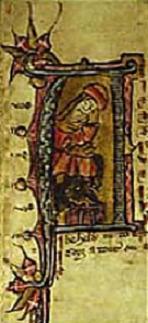William Langland
[1] Langland is believed to have been born in Cleobury Mortimer, Shropshire,[2] although Ledbury, Herefordshire, and Great Malvern, Worcestershire also have strong claims to being his birthplace.
A note written by "Iohan but" (John But) in a fourteenth-century manuscript of the poem (Rawlinson 137) makes direct reference to the death of its author: "whan this werke was wrouyt, ere Wille myte aspie/ Deth delt him a dent and drof him to the erthe/ And is closed vnder clom" ("once this work was made, before Will was aware/ Death struck him a blow and knocked him to the ground/ And now he is buried under the soil").
The C text of the poem contains a passage in which the narrator describes himself as a "loller" or "idler" living in the Cornhill area of London, and refers to his wife and child, who are respectively named Katherine and Nicolette.
A similar passage in the final Passus of the B and C texts provides further ambiguous details on the poet's wife and his torments by Elde (Old Age), including baldness, gout, and impotence.
The detailed and highly sophisticated religious knowledge displayed in the poem indicates that Langland had some connection to the clergy, but the nature of this relationship is uncertain.
He is probably best regarded, John Bowers writes, as a member of "that sizable group of unbeneficed clerks who formed the radical fringe of contemporary society ... the poorly shod Will is portrayed 'y-robed in russet' traveling about the countryside, a crazed dissident showing no respect to his superiors".
Malcolm Godden has proposed that he lived as an itinerant hermit, attaching himself to a patron temporarily and exchanging writing services for shelter and food.
It is true that Langland and Wycliffe shared many concerns: Both questioned the value of indulgences and pilgrimages, promoted the use of the vernacular in preaching, attacked clerical corruption, and even advocated disendowment.
